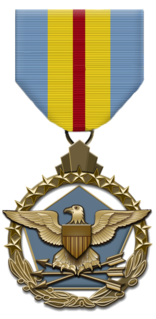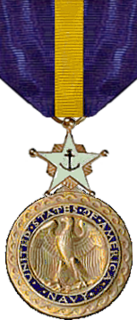
The Distinguished Service Medal (DSM) is a military decoration of the United States Army that is presented to soldiers who have distinguished themselves by exceptionally meritorious service to the government in a duty of great responsibility. The performance must be such as to merit recognition for service that is clearly exceptional. The exceptional performance of normal duty will not alone justify an award of this decoration.

The Defense Distinguished Service Medal is a military decoration of the United States Department of Defense, which is presented to United States Armed Forces servicemembers for exceptionally distinguished performance of duty contributing to the national security or defense of the United States. The medal was created on July 9, 1970, by President Richard Nixon in Executive Order 11545. President Nixon awarded the first medal, on the day the Executive Order was signed, to General Earle Wheeler, who was retiring from the US Army after serving as Chief of Staff of the United States Army and then Chairman of the Joint Chiefs of Staff.

John Leonard Hines was an American general who served as Chief of Staff of the United States Army from 1924 to 1926.

The Navy Cross is the United States Navy and United States Marine Corps' second-highest military decoration awarded for sailors and marines who distinguish themselves for extraordinary heroism in combat with an armed enemy force. The medal is equivalent to the Army's Distinguished Service Cross, the Air Force and Space Force's Air Force Cross, and the Coast Guard Cross.

The Distinguished Service Cross (DSC) is the United States Army's second highest military decoration for soldiers who display extraordinary heroism in combat with an armed enemy force. Actions that merit the Distinguished Service Cross must be of such a high degree that they are above those required for all other U.S. combat decorations, but which do not meet the criteria for the Medal of Honor. The Army Distinguished Service Cross is equivalent to the Navy and Marine Corps' Navy Cross, the Air Force and Space Force's Air Force Cross, and the Coast Guard Cross. Prior to the creation of the Air Force Cross in 1960, airmen were awarded the Distinguished Service Cross.

The Navy Distinguished Service Medal is a military decoration of the United States Navy and United States Marine Corps which was first created in 1919 and is presented to sailors and Marines to recognize distinguished and exceptionally meritorious service to the United States while serving in a duty or position of great responsibility.

George Veazey Strong was a U.S. Army general with the rank of major general, who is most famous for his service as commander of the Military Intelligence Corps during World War II.

Paul Edwin Menoher Jr. was a U.S. Army officer.
Major General Walter H. Yates Jr. is a retired United States Army officer who served as Deputy Commanding General of the Fifth United States Army. He is a native of Hattiesburg, Mississippi and graduate of The University of Southern Mississippi. He also holds a Master of Science degree in Foreign Affairs from George Washington University. In addition, General Yates attended the DOD Joint Warfighting course and the Harvard program for National and International Securities Studies.
Leo A. Brooks Sr. is a retired major general of the United States Army who later became city manager of Philadelphia.

General Donn Albert Starry was a United States Army four-star general who served as commanding general of United States Army Training and Doctrine Command from 1977 to 1981, and as commander in chief of United States Readiness Command from 1981 to 1983.

John William Foss was a United States Army general, and commander of the United States Army Training and Doctrine Command.

John Harold Tilelli Jr. is a retired United States Army four-star general who served as Vice Chief of Staff of the United States Army from 1994 to 1995; Commanding General, United States Army Forces Command from 1995 to 1996; and Commander in Chief, United Nations Command/Commander in Chief, ROK/United States Combined Forces Command/Commander, United States Forces Korea from 1996 to 1999. He retired from the United States Army on January 31, 2000 and later worked for the USO and The Aerospace Corporation.

Arthur Edmon Brown Jr. was a United States Army four-star general who served as Vice Chief of Staff of the United States Army (VCSA) from 1987 to 1989.

John Lawson Ballantyne III is a retired lieutenant general in the United States Army.

Richard Gordon Graves is a retired lieutenant general in the United States Army. He was Commander of III Corps and Fort Hood. He is a 1958 graduate of the U.S. Military Academy.

Michael John Conrad is a retired United States Army major general who served as Commanding General, 1st Cavalry Division from 1984 to 1986. He graduated from the United States Military Academy with a B.S. degree in military science in 1956. Conrad later earned an M.S. degree in mathematics from the Rensselaer Polytechnic Institute in 1965.

William Willis Eagles was a highly decorated officer in the United States Army with the rank of major general. A graduate of the United States Military Academy, he is most noted for his service as Commanding general, 45th Infantry Division during Italian campaign during World War II.

Aaron Bradshaw Jr. was a highly decorated officer in the United States Army with the rank of major general. A graduate of the United States Military Academy, he is most noted as Anti-Aircraft Artillery officer during the World War II.

Dale Allen Vesser is a retired lieutenant general in the United States Army. He served as Director for Strategic Plans and Policy (J-5) for the Joint Chiefs of Staff from 1985 until his retirement in 1987.


















